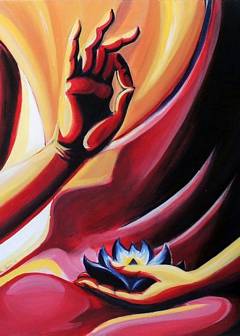 Humility in the Zen tradition additionally involves some kind of frolicsomeness, which is a sense of humor. In most religious Zen traditions, you feel self-effacing for the reason that of trepidation of penalization, pain and sin. In the Shambhala world, you feel full of it. You feel salubrious and good. In fact, you feel proud. Consequently, you feel humility. That’s one of the Shambhala contradictions or, we could verbalize, dichotomies. Authentic humility is genuineness. To be able to conquer your pain and your fear of death requires great determination.
Humility in the Zen tradition additionally involves some kind of frolicsomeness, which is a sense of humor. In most religious Zen traditions, you feel self-effacing for the reason that of trepidation of penalization, pain and sin. In the Shambhala world, you feel full of it. You feel salubrious and good. In fact, you feel proud. Consequently, you feel humility. That’s one of the Shambhala contradictions or, we could verbalize, dichotomies. Authentic humility is genuineness. To be able to conquer your pain and your fear of death requires great determination.
However, you should be cognizant that this kind of interrupted practice is not the ideal approach to Zen. We can bear with greater ease those losses that we know we will inevitably face, for the reason that we identify with the thread of wakefulness that we meet in all of them. We call this retreat a Zen retreat but actually, it is just a suffering or training retreat. After all, if you are not a good practitioner, why are you still here after five days?
Your mind is still limpidly cognizant of kenning certain things but does not endeavor to bring up these recollections as criteria for comparing and judging. Using the method can be likened to pumping air into a tire.
Zen Koan: “Eshun’s Departure” Parable
When Eshun, the Zen nun, was past sixty and about to leave this world, she asked some monks to pile up wood in the yard.
Seating herself firmly in the center of the funeral pyre, she had it set fire around the edges.
“O nun!” shouted one monk, “is it hot in there?”
“Such a matter would concern only a stupid person like yourself,” answered Eshun.
The flames arose, and she passed away.
Buddhist Insight on Arduous Discipline
Conventional truth alone is the teacher of the absolute. Without arduous discipline, nobody can become perfect by merely ceasing to act. In addition, they must sometimes contemplate in their minds the thought that someday they will turn away from the transient things of the world to something better, to something more sure and lasting. I am not particularly trying to be dramatic. The Scottish Episcopal cleric writer Richard Holloway writes in Doubts and Loves: What is Left of Christianity,
The genius of Buddhism is it is a Middle Way that repudiates two extremes, the worthless life of self-indulgence and the equally worthless life of self-torture. The difference between Buddhism and Christianity is that Buddhism is essentially a practice, an arduous discipline that can deliver peace and compassion to its adherents. Christianity also has its spiritual disciplines, but it has never able to divest itself of the belief that doctrines are themselves saving and life-changing. Much of this goes back to the originating genius of Christian theology, Saul of Tarsus who became Paul. The paradox is that what was for Paul a liberating psychological experience was later to be hardened into a formula that radically contradicted his original insight and the experience that prompted it.